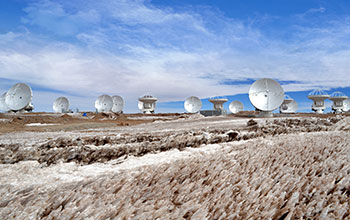Multimedia Gallery
Sixteen Antennas on Chajnantor Plateau
The 16th antenna of the Atacama Large Millimeter/submillimeter Array (ALMA) has reached the heights of the Chajnantor Plateau, in the Atacama Desert of South America, after having been transported to the observatory's Array Operations Site (AOS). The 12-meter-diameter antenna, which was a European deliverable, has arrived at 5,000 meters above sea level where it joined antennas from the North American and the East Asian ALMA partners. Although this sounds like just another number, 16 is the number of antennas specified for ALMA to begin its first science observations, and is therefore an important milestone for the project. Soon, astronomers will begin conducting new scientific research with ALMA.
ALMA is an international astronomy facility that is a partnership of Europe, North America and East Asia in cooperation with the Republic of Chile. It is funded in part by the National Science Foundation. To learn more, visit the ALMA website. (Date of Image: unknown)
Credit: ALMA (ESO/NAOJ/NRAO), R. Durán (ALMA)
Special Restrictions: Before using this image, please read the ALMA "Terms of Use."
Images and other media in the National Science Foundation Multimedia Gallery are available for use in print and electronic material by NSF employees, members of the media, university staff, teachers and the general public. All media in the gallery are intended for personal, educational and nonprofit/non-commercial use only.
Images credited to the National Science Foundation, a federal agency, are in the public domain. The images were created by employees of the United States Government as part of their official duties or prepared by contractors as "works for hire" for NSF. You may freely use NSF-credited images and, at your discretion, credit NSF with a "Courtesy: National Science Foundation" notation.
Additional information about general usage can be found in Conditions.
Also Available:
Download the high-resolution JPG version of the image. (5 MB)
Use your mouse to right-click (Mac users may need to Ctrl-click) the link above and choose the option that will save the file or target to your computer.

